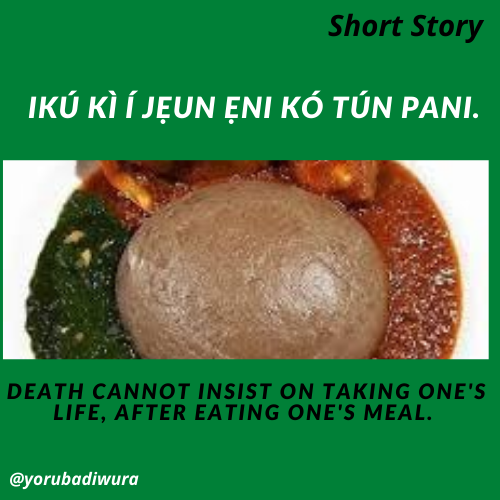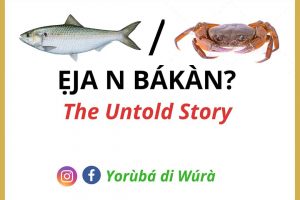Ikú Kì í Jẹun Ẹni Kó Tún Pani

This proverb is one of the extractions from Ifá corpus. The story is centred on Ọ̀rúnmìlà, Èṣù, and Ikú (Death).
There was once a disagreement between Ọ̀rúnmìlà and Ikú, so Ikú as his name implies vowed to kill Ọ̀rúnmìlà. This made Ọ̀rúnmìlà consult his oracle. The divination directed him to prepare a sacrifice and place it at the T-junction (oríta-mẹ́ta). Ọ̀rúnmìlà did as the oracle instructed.
Èṣù, the diety in charge of sacrifice had quickly taken the sacrifice to the pathway leading to Ọ̀rúnmìlà’s house. On his way to actualise his deadly mission, Ikú ignorantly ate the meal prepared by Ọ̀rúnmìlà. As he was about to enter the house of Ọ̀rúnmìlà, he met Èṣù who engaged him in a brief conversation. During the conversation, Ikú declared his mission to take the life of Ọ̀rúnmìlà. Èṣù then reminded him of the sacrifice at the T-junction, of which Ikú vehemently affirmed that he just ate the meal.
At that point, Èṣù burst into laughter in disagreement to Ikú’s deadly mission. Then, Ikú powerlessly turned back, and was unable to kill Ọ̀rúnmìlà. At this, Èṣù proverbially said: ‘Ikú kì í jẹun ẹni kó tún pani’ which literarily means, death cannot insist on taking one’s life after eating one’s meal.
Hence, it becomes a proverb to this day.




